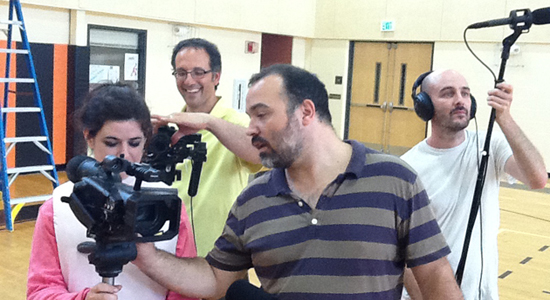Fenway Park organist Josh Kantor is a utilityman of sorts, playing keyboards for a number of outfits in addition to entertaining the Red Sox faithful. His highest-profile gig is with the fantastic national pastime-themed band the Baseball Project; his hidden-track rendition of the group’s “Panda And The Freak” is a highlight of its aptly titled third album, 3rd (Yep Roc). Kantor is guest editing magnetmagazine.com all week. Read our brand-new Q&A with him.

Kantor: When Morgan Nichols and I met at age 19, at the beginning of a creatively fruitful period of doing improvisational musical theater together, he’d already spent several years making entertaining no-budget short films, using friends and relatives and neighbors and teachers as actors, cinematographers, key grips and craft service (many of these same people continue to be involved in his films decades later). Morgan grew up in a small town in Maine, where DIY was more of a practical approach to daily labors than a burgeoning artistic ethos. His interest in both of those realms has allowed him to incorporate the best elements of each (the true resourcefulness of the former, the ebullient camaraderie of the latter) into his films.
From what I can tell, Morgan never had Hollywood aspirations. He went to film school in Los Angeles because he saw it as a good way to get answers to the thousands of questions he had amassed about how to make better films, and while there he was able to learn many of those answers. He also learned that his approach was uncommon, but that it offered a vision for a more democratized film industry. Just as electric guitars and affordable cassette recorders had once taken a chunk of record-making away from behind the gates of major labels, so too, Morgan reasoned, could the emergence of laptops and digital cameras rescue some good movie-making from oligarchic film studios. I don’t mean to imply that Morgan was the first or only person to come up with this idea, but his clarity of purpose, his lengthy dedication to these ideals, his hands-on involvement and his ideas for how best to empower fledgling filmmakers are noteworthy.
After film school, Morgan made two terrific award-winning feature-length movies, Jesus Freak and The Little Death, for roughly the same cost as what Spielberg’s “coffee for the set designers” budget would have been (in the former film, I played a character who, depending on your interpretation, either is or isn’t Jesus. We lived in an abandoned juvenile detention hall in Portales, N.M., during the month-long shoot). He also made dozens of “no script and no budget” short films, asking friends, “Who wants to come make a movie this Saturday and watch it on Sunday?” This practice became known as Lo-Films (a few of these, including my favorite, Tales From The Vampire State, are online). Morgan would often call me after a Lo-Film shoot to say, “It’s a movie about [fill in the blank] … can you send me a song?” And I would quickly record some musical ideas and zap them over to him to put in the movie. Most of the Lo-Films aren’t great, nor are they intended to be; they are a good excuse to exercise creative muscles, to have fun with friends and to overcome fears about the messiness that can result from working very quickly. The idea is that, if you regularly practice all of these things, then you will flourish when the time comes to work with a script and a modicum of infrastructure.
As the basic technological tools found their way into the hands of growing numbers of young DIY filmmakers, Morgan fleshed out his ideas about how to make the kind of training he received in film school accessible to this group. Believing that their creative talents can progress with simple yet expert instruction on technique for elements such as lighting, framing, sound, and storytelling, he released a narrative feature film last year called How To Make Movies At Home. It’s about a small town in Maine with a vibrant local “movie band” scene, where the elder band in town decides to make a movie that it hopes will empower the other bands to develop some chops that will complement the youthfulness and raw talent that have carried them thus far. It’s also about conflicts between the industry and the scene, and about the dysfunction that bands sometimes experience when they become like family. And if all that’s not “meta” enough for you, Morgan is screening the film on college campuses and meeting young filmmakers there to teach them and learn from them.
The next scheduled screenings for How To Makes Movies At Home are on May 31 and June 1 at The Sanford International Film Festival in Maine. The film recently made its Boston-area premiere at Brandeis University, which is where Morgan and I first met in 1991, along with at least six other long-time collaborators who worked on it, including comedian Oded Gross (writer of many a funny song) and author Laura Lee Bahr. I’m proud and honored to have contributed some music to the film’s soundtrack.
http://vimeo.com/39461172Trailer for “How To Make Movies At Home.”
Photo by John-Andrew Morrison





